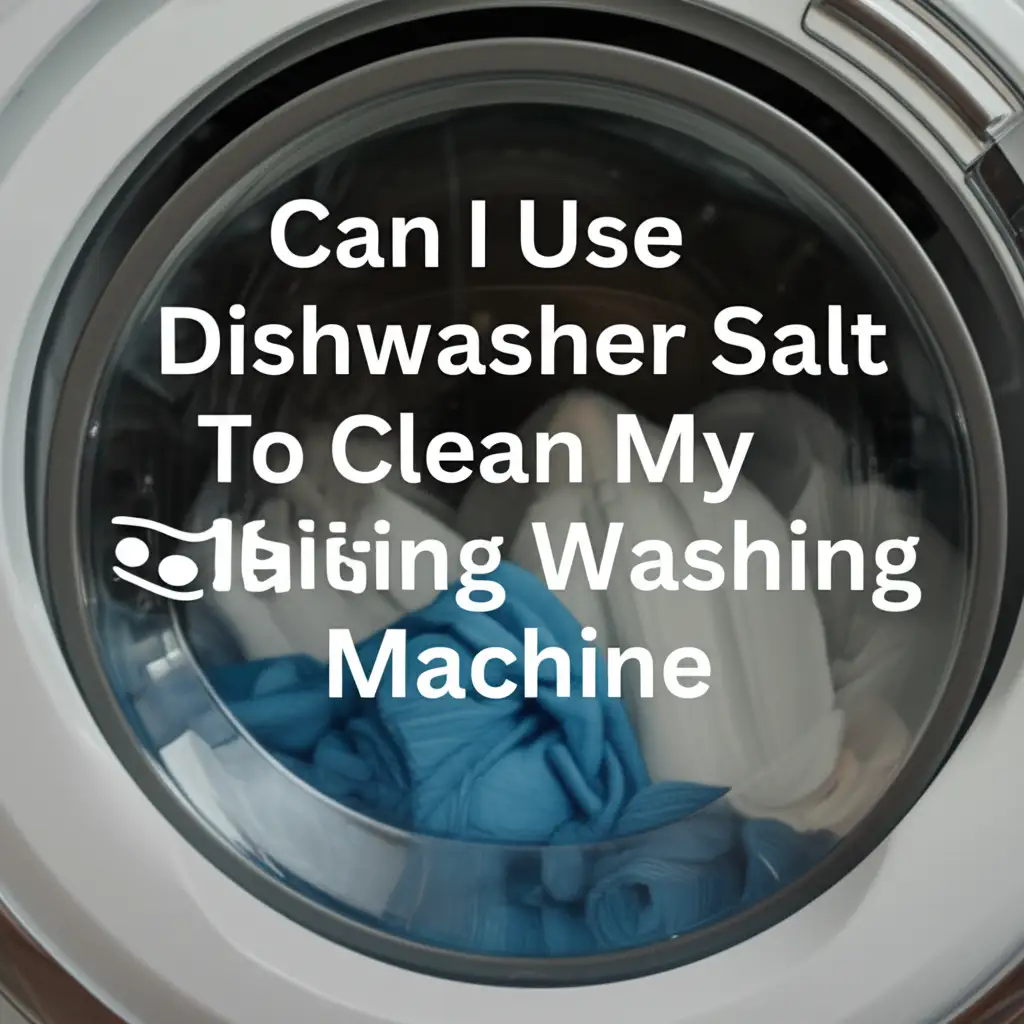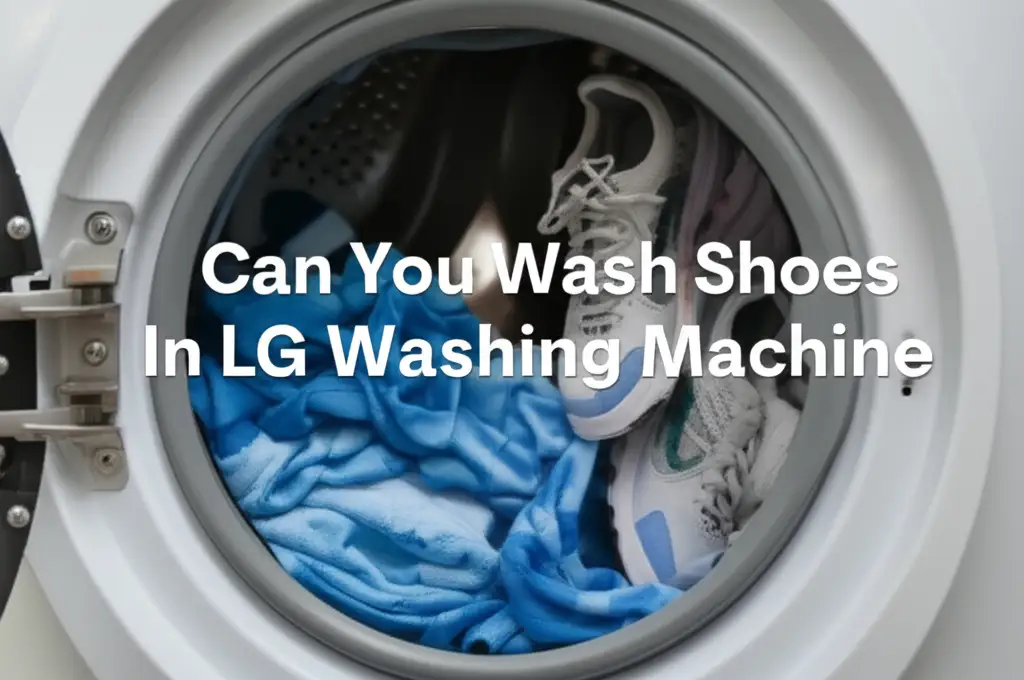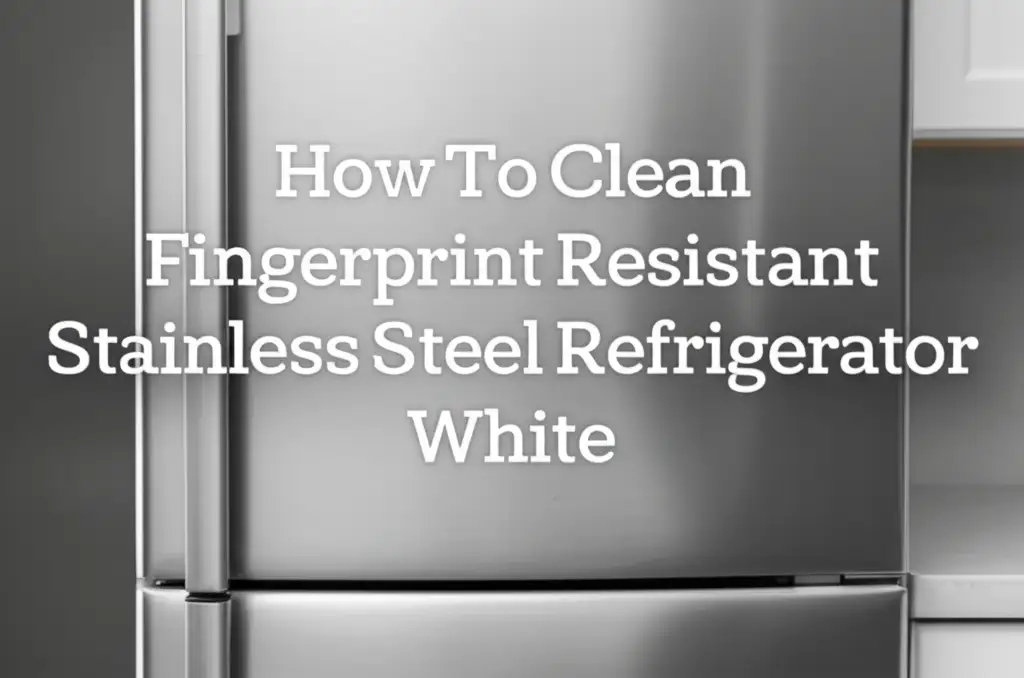· Todd Martin · Appliance Care · 19 min read
Can I Use Dishwasher Salt To Clean My Washing Machine

Cleaning Your Washing Machine: Can Dishwasher Salt Help?
Many of us look for simple answers to household problems. When your washing machine starts smelling less than fresh, or your clothes no longer feel truly clean, a common question might pop into your head: Can I use dishwasher salt to clean my washing machine? It seems like a logical leap. Both appliances use water, and both can suffer from mineral buildup. I certainly understand the urge to find a quick, available fix.
However, the answer is not as simple as it seems, and it leans heavily towards “no.” Using the wrong product can cause more harm than good to your valuable appliance. Your washing machine needs specific care. Dishwasher salt has a very particular job in a different machine. We will explore why dishwasher salt is not suitable for your washing machine. We will also look at effective, safe methods for keeping your laundry appliance clean. This article explains the right ways to maintain your washing machine. It covers why different salts serve different purposes. You will learn how to keep your machine fresh and working well.
Takeaway
- Dishwasher salt is for dishwashers, not washing machines.
- Using dishwasher salt in a washing machine can damage its parts.
- Washing machines need specific cleaners or natural options like vinegar and baking soda.
- Regular maintenance keeps your washing machine performing well and odor-free.
No, you should not use dishwasher salt to clean your washing machine. Dishwasher salt is specifically designed for water softening in dishwashers to protect dishes and the machine from hard water deposits. It can corrode washing machine components and seals, leading to costly damage. Always use products made for washing machines or recommended natural alternatives.
Understanding Dishwasher Salt: What It Is and How It Works
Dishwasher salt is a special form of sodium chloride, which is pure salt. It looks like coarse table salt but is much purer. This purity is important for its intended use. Dishwasher salt does not contain additives like iodine or anti-caking agents found in food salts. These additives could harm your dishwasher’s internal parts.
The main job of dishwasher salt is to regenerate the ion-exchange resin. This resin is inside your dishwasher’s built-in water softener. Hard water contains minerals like calcium and magnesium. These minerals cause limescale. Limescale can leave spots on your dishes and damage the dishwasher over time. The ion-exchange resin traps these hard water minerals. Over time, the resin becomes saturated. Dishwasher salt flushes out the trapped minerals from the resin. This process recharges the resin, making it ready to soften more water. This ensures your dishwasher cleans effectively. It also protects the machine from hard water damage. For more details on how this works, you can read about how to use Finish salt for dishwasher.
This unique function is vital for dishwashers, especially in areas with hard water. Without it, hard water would build up on heating elements and spray arms. This would reduce cleaning performance and machine lifespan. Dishwasher salt works within a closed system. It interacts specifically with the water softener unit. This unit is a core part of how how to use dishwasher technology functions. It is important to remember that this system is unique to dishwashers. Washing machines do not have the same design.
I have seen many people confuse the roles of different salts. It makes sense to think that if one salt helps with water in one appliance, it might help in another. However, each appliance has its own needs. Dishwasher salt’s high concentration and specific mechanism are tailored for dishwashers. It is not a general-purpose water softener for all home appliances. My experience confirms that using products for their intended purpose prevents issues. This understanding is key to avoiding accidental damage to your household appliances.
Why Dishwasher Salt Isn’t for Your Washing Machine
Now, let’s talk about why using dishwasher salt in your washing machine is a bad idea. Your washing machine simply does not have the same water softening system as a dishwasher. There is no special compartment for dishwasher salt. It does not have the ion-exchange resin unit that needs regeneration. Putting dishwasher salt directly into the washing machine drum or detergent dispenser can cause significant problems.
First, the salt is highly concentrated. It dissolves quickly. This creates a very salty solution. This solution can be corrosive to your washing machine’s internal components. Metals, rubber seals, and plastic parts are all at risk. The salt can corrode metal parts, leading to rust. It can degrade rubber seals, causing leaks. It can even block hoses or the pump. Repairs from such damage can be very expensive. I know I would not want to face a flooded laundry room due to a simple mistake.
Second, the salt crystals themselves might not dissolve completely. If they do not dissolve, they can cause blockages. These undissolved crystals can scratch the drum. They can also get stuck in the drain pump or hoses. This can lead to pump failure or drainage issues. The last thing you want is standing water in your machine after a wash cycle. This problem also ties into the washing machine’s design. It is not built to handle highly concentrated salt solutions. A washing machine uses detergents and water to clean clothes. It does not need a salt to “clean” its internal system.
Finally, dishwasher salt offers no real benefit to your washing machine. Its purpose is to regenerate a resin. Washing machines typically manage hard water through different means. They may rely on detergents with water-softening agents. Or, you might use external water softeners for your whole home. Some washing machines do have built-in softeners, but these are usually self-contained and do not require external salt. You could even find that using dishwasher salt makes things worse. It might leave a residue on your clothes. It could also interfere with how your laundry detergent works. It is simply the wrong tool for the job.
Common Culprits Behind Washing Machine Dirt and Odor
My washing machine, like yours, can develop unpleasant odors and dirt. It is a common problem that many homeowners face. Understanding the real causes helps us clean it properly. The main culprits are not what you might think. They are usually related to daily use and maintenance habits.
One primary cause is detergent and fabric softener residue. We often use too much detergent or fabric softener. These products do not always rinse away completely. They build up in the drum, dispenser drawer, and even the hoses. This sticky residue traps dirt, lint, and grime. Over time, it creates a breeding ground for bacteria and mold. It is like a hidden slime layer forming inside your machine. I always make sure to measure my detergent accurately to avoid this.
Mold and mildew are huge contributors to bad smells. This is especially true for front-loading washing machines. The rubber gasket around the door is a perfect spot for mold to grow. It stays damp and dark. Mold thrives in such conditions. You might see black spots or feel a slimy film. This mold transfers to your clothes during a wash cycle. It can make clothes smell musty. This is a common issue that needs specific attention. You can find help on how to clean mold from washing machine.
Hard water deposits can also cause issues, but differently from dishwashers. In washing machines, hard water leaves behind mineral buildup on heating elements and in hoses. This buildup can reduce efficiency. It can also trap dirt and odors. While it is a mineral issue, it does not require dishwasher salt for removal. Instead, it needs descaling agents designed for washing machines. These are typically acids or special cleaners.
Lastly, low-temperature washing cycles contribute to the problem. Many people wash clothes in cold water. Cold water does not kill bacteria and fungi as effectively as hot water. It also does not dissolve detergents as well. This leads to more residue buildup. Over time, the machine develops a persistent musty smell. This is why regular hot cycles or cleaning cycles are important. These issues combine to make your washing machine dirty and smelly. Addressing these real problems leads to a truly clean machine.
Safe and Effective Ways to Clean Your Washing Machine
Cleaning your washing machine is important for its longevity and performance. Forget about dishwasher salt. There are much safer and more effective methods. I have personally used these methods. They keep my machine sparkling and my laundry fresh. The key is to use the right products and techniques.
Vinegar and Baking Soda Method
This is my go-to natural cleaning solution. It is effective and gentle on your machine.
- Prepare the machine: Ensure your washing machine is empty. Close the door.
- Add white vinegar: Pour two cups of white vinegar into the detergent dispenser. For older machines or those needing a deeper clean, you can pour it directly into the drum.
- Run a hot cycle: Start the hottest water setting on your machine. Let it run for a few minutes. Then pause the cycle. This allows the vinegar to soak and break down grime. Let it sit for an hour.
- Add baking soda: After the soak, add half a cup of baking soda to the detergent dispenser.
- Complete the cycle: Resume the cycle and let it finish. The baking soda helps scrub away residue and neutralize odors.
- Wipe down: After the cycle, wipe the drum, door seal (gasket), and dispenser drawer with a damp cloth. This removes any loosened dirt. For a detailed guide, see how to clean washing machine with vinegar.
Commercial Washing Machine Cleaners
Many brands offer dedicated washing machine cleaners. These are specifically formulated to tackle odors, mold, and residue. I use these every few months for a thorough clean.
- Read instructions: Always follow the product’s instructions carefully. They vary by brand.
- Add cleaner: Typically, you add the cleaner directly into the detergent dispenser or drum.
- Run a hot cycle: Run a hot water cycle without any clothes. Some cleaners have a specific “clean cycle” setting. These cleaners work well for specific brands too. For example, methods used in how to clean Samsung washing machine often involve such commercial products.
Cleaning the Detergent Dispenser, Gasket, and Filter
These parts often get overlooked but are crucial for a clean machine.
- Detergent Dispenser: Remove the dispenser drawer if possible. Soak it in warm, soapy water. Use a brush or old toothbrush to scrub away sticky residue and mold. Rinse thoroughly.
- Gasket (Door Seal): Pull back the rubber seal around the door. You will likely find trapped water, lint, and mold. Wipe it thoroughly with a cloth dipped in vinegar or a bleach solution (if safe for your machine). Pay attention to all crevices.
- Drain Filter: Most machines have a drain pump filter. This traps lint, coins, and other small items. Refer to your machine’s manual to locate and clean it. Place a towel underneath to catch water. Unscrew the cap, remove debris, and clean the filter under running water. This can greatly reduce odors. Learn more about how to clean washing machine filter.
By following these steps, you will keep your washing machine in top shape. It will run efficiently and keep your clothes smelling fresh. Regular cleaning helps extend your machine’s life. This saves you money in the long run. These practices ensure a truly clean machine from the inside out, addressing all the typical buildup issues. Consider this a vital part of [how to clean your washing machine inside](https://homeessentialsguide.com/how-to-clean-your-washing machine-inside).
Hard Water and Your Washing Machine: The Real Solutions
Hard water is a common challenge for washing machines. It contains high levels of minerals like calcium and magnesium. These minerals can build up over time. This buildup, known as limescale, can affect your machine’s efficiency. It can also leave residue on your clothes. I live in an area with hard water, so I know this problem well. The solutions for hard water in washing machines are different from those for dishwashers.
First, dedicated washing machine descalers are a good option. These products are formulated to dissolve limescale and mineral buildup specifically in washing machine environments. They are typically acidic and designed to be safe for machine components. You add them to an empty machine and run a hot cycle. These descalers clean heating elements, hoses, and the drum. They restore your machine’s performance. They also help prevent future buildup when used regularly. It is important to choose a product made for washing machines. Using the wrong product can do more harm than good.
Second, laundry water softeners can be added to your wash cycle. These are different from dishwasher salt. They are liquid or powdered additives you put in with your detergent. They work by chelating (binding to) the hard water minerals. This prevents minerals from reacting with detergents. It also stops them from depositing on clothes or inside the machine. These softeners improve detergent performance. They also make clothes feel softer. They help keep your machine cleaner over time. This is a simple, effective way to manage hard water during every wash.
Third, optimizing detergent dosing is critical. Hard water reduces the effectiveness of laundry detergents. This means you might need to use slightly more detergent than recommended for soft water. However, there is a fine line. Using too much detergent leads to residue buildup, as we discussed earlier. It is a balance. Check your detergent’s packaging for hard water recommendations. Adjusting the amount helps your detergent work better. It also prevents mineral and soap scum buildup. Some detergents even include built-in water softening agents.
Lastly, for severe hard water issues, a whole-house water softener might be considered. This system treats all the water entering your home. It softens water for all appliances, including your washing machine, dishwasher, and showers. This is a larger investment. However, it provides long-term benefits for all water-using appliances. It protects them from mineral damage. It also reduces soap scum throughout your home. This comprehensive approach is the most effective solution for very hard water. These real solutions tackle hard water problems directly. They help your washing machine stay clean and efficient for years.
Preventative Maintenance for a Fresh Washing Machine
Preventative maintenance is key to a long-lasting, odor-free washing machine. It is much easier to prevent problems than to fix them. I have learned that a few simple habits can make a huge difference. These habits extend the life of your machine. They also ensure your clothes come out truly clean and fresh every time.
First, always leave the washing machine door ajar after a cycle. This is especially important for front-loading machines. The inside of the drum and the rubber gasket can trap moisture. Moisture creates a perfect environment for mold and mildew to grow. Leaving the door slightly open allows air to circulate. This helps the machine dry out completely. I make this a rule in my home. It stops those musty smells before they even start. You will notice a big difference in freshness.
Second, wipe down the rubber gasket and detergent dispenser regularly. These areas collect detergent residue, lint, and moisture. They are prime spots for mold and grime. After every few washes, take a damp cloth. Wipe inside the folds of the rubber seal. Also, remove the detergent dispenser drawer. Clean out any sticky buildup. This simple wipe-down prevents accumulation. It stops odors from developing right at their source. This quick action is a critical part of do it yourself washing machine care.
Third, run a hot water cleaning cycle monthly. Even if you mostly use cold water for laundry, a hot empty cycle is necessary. Add a cup or two of white vinegar or a commercial washing machine cleaner. This hot cycle helps to flush out accumulated residue, mold spores, and bacteria. It also dissolves mineral deposits that might be starting to form. This regular deep clean keeps the machine sanitized. It maintains its internal cleanliness. This practice ensures that no hidden grime builds up over time.
Fourth, use the correct type and amount of detergent. Using high-efficiency (HE) detergent in HE machines is vital. HE detergents produce fewer suds. This is important for machines that use less water. Too many suds can leave residue. This residue fosters mold growth. Also, using too much detergent, even HE detergent, can lead to buildup. Follow the manufacturer’s recommendations for detergent amounts. This prevents unnecessary residue. This also applies when you start to use a new washing machine for the first time. Understanding proper use from the start prevents issues later.
By implementing these preventative maintenance steps, you will greatly reduce the need for intensive cleaning. Your washing machine will stay fresh, clean, and efficient. This means cleaner clothes and a longer lifespan for your appliance. It is a small effort for big benefits.
Dispelling Myths: Other “Quick Fixes” to Avoid
In the world of home cleaning, many myths circulate. People often look for simple, cheap solutions for appliance problems. However, some common “quick fixes” can actually harm your washing machine. Just like dishwasher salt, certain household items are not suitable. I have seen many people try these, only to create bigger issues. Let’s clear up some of these misconceptions.
One common myth involves using regular dish soap in the washing machine. People think if it cleans dishes, it can clean a machine. However, dish soap is designed to create a lot of suds. It cleans by lifting grease and food particles. Washing machines, especially high-efficiency (HE) models, use very little water. A small amount of dish soap will produce an excessive amount of suds. This creates a “suds lock.” The machine might overflow. It can also damage the motor or drainage system. The suds are very difficult to rinse out. They can leave a sticky residue inside the machine and on your clothes. This residue can lead to mold and mildew. Always use laundry detergent or cleaners made for washing machines. If you are curious about dish soap, refer to how much dish soap can I use in the washing machine to avoid problems.
Another common idea is to use excessive amounts of bleach. While bleach is a powerful disinfectant, using too much can be problematic. Bleach can corrode rubber seals and plastic components over time. It can also strip the finish from your machine’s drum if used improperly or too often. For mold and mildew, a diluted bleach solution can be effective. But it should be used cautiously. Always follow recommended dilution ratios. Rinse the machine thoroughly afterward. For a general clean, vinegar or dedicated washing machine cleaners are safer, gentler alternatives.
Some people might consider other types of salts, such as table salt or Epsom salts. Just like dishwasher salt, these are not suitable. Table salt often contains additives like iodine, which can be corrosive. Epsom salts are magnesium sulfate. They do not have the same water-softening properties as dishwasher salt in this context. They can also leave residue. Any type of granular salt can cause blockages or damage. Your washing machine is an intricate piece of equipment. It needs products designed for its specific mechanisms.
It is best to stick to proven cleaning methods. These include white vinegar, baking soda, or commercial washing machine cleaners. These products are safe and effective. They will clean your machine without causing damage. Avoiding these common “quick fixes” protects your appliance and saves you from costly repairs. Always verify information before trying new cleaning agents in your home appliances.
Frequently Asked Questions
Can I use table salt to clean my washing machine?
No, you should not use table salt to clean your washing machine. Table salt, like dishwasher salt, is not formulated for washing machines. It often contains iodine or anti-caking agents that can be corrosive to internal parts. Using it can damage seals, metals, and hoses, leading to expensive repairs and potential leaks. Stick to cleaning products made for washing machines.
How often should I clean my washing machine?
You should clean your washing machine at least once a month. If you live in an area with hard water, wash frequently, or notice odors, consider cleaning it every two to three weeks. Regular monthly cleaning prevents residue buildup, mold growth, and ensures your machine operates efficiently. This helps your laundry stay fresh.
What are the signs my washing machine needs cleaning?
Common signs include a musty or sour smell coming from the drum or door seal. You might also notice residue on your clothes after a wash cycle, or clothes not smelling as fresh as they should. Visible mold or mildew on the rubber gasket or detergent dispenser also indicates a need for cleaning.
Is vinegar safe for all washing machines?
Yes, white vinegar is generally safe for most washing machines, including HE models. Its mild acidity helps dissolve mineral deposits, soap scum, and kill mold and bacteria. Always use plain white vinegar, not apple cider or other types. Run an empty, hot cycle with vinegar, then wipe down affected areas for best results.
Can I use bleach to clean my washing machine?
You can use bleach to clean your washing machine, but with caution and in moderation. Bleach is effective against mold and mildew. However, it can be harsh on rubber seals and plastic parts if used too often or in high concentrations. Always dilute it and run an empty cycle, then rinse thoroughly. Vinegar is often a gentler alternative.
What is the best product to clean a washing machine?
The best product depends on your needs. For a natural option, white vinegar and baking soda are excellent. For commercial cleaners, brands like Affresh, OxiClean Washing Machine Cleaner, or Tide Washing Machine Cleaner are highly rated. Always choose a product specifically designed for washing machines. Read and follow the instructions carefully.
Conclusion
So, to directly answer the question, can I use dishwasher salt to clean my washing machine? The clear answer is no. While dishwasher salt is a valuable tool for softening water in your dishwasher, it is not designed for your washing machine. Using it can lead to corrosion, blockages, and costly damage. Dishwasher salt serves a specific purpose in a unique appliance system. Your washing machine operates differently and requires different care.
I hope this article has clarified why this common household item is not suitable for your laundry appliance. We have explored the proper functions of dishwasher salt. We also looked at the real reasons behind washing machine odors and dirt. More importantly, I have shared safe and effective methods for cleaning your washing machine. Using natural solutions like white vinegar and baking soda, or dedicated commercial cleaners, will keep your machine fresh. Regular maintenance, such as leaving the door ajar and wiping down the gasket, is also vital.
By understanding the correct cleaning techniques and performing regular preventative maintenance, you will protect your investment. Your washing machine will run efficiently. Your clothes will come out cleaner and smell fresher. Do not risk damaging your appliance with inappropriate products. Embrace the proven methods for effective and safe washing machine care. Take control of your home maintenance today. Make a cleaning schedule for your washing machine. Your clothes and your appliance will thank you for it.
- dishwasher salt
- washing machine cleaning
- appliance maintenance
- hard water
- laundry tips





